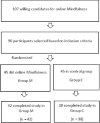Effect of an online mindfulness program on stress in Indian adults during COVID-19 pandemic: A randomized controlled preliminary study
- PMID: 36060713
- PMCID: PMC9435616
- DOI: 10.4103/indianjpsychiatry.indianjpsychiatry_4_21
Effect of an online mindfulness program on stress in Indian adults during COVID-19 pandemic: A randomized controlled preliminary study
Abstract
Background: The Indian population is suffering from a high prevalence of mental stress and the situation has been worsened by the COVID-19 pandemic. Mindfulness, which can also be conducted online, has been used as a stress-relieving therapy in the Western world. There is not much experience with mindfulness in the Indian population. The COVID-19 pandemic demands the development of alternative therapies which can reach out to the masses at a minimal cost, avoiding direct personal contact. The researchers wanted to explore the potential of mindfulness as a stress-relieving therapy.
Aim: To note any improvement in perceived stress of the participants compared to the controls.
Methods: Ninety apparently healthy adults were randomized into group M (all of whom participated in an online mindfulness program) and group C (all of whom attended placebo sessions), with 45 participants each. Final sample size was n = 42 (group M) and n = 38 (group C). The perceived stress was measured using the perceived stress scale before and after the program. Qualitative data was collected in the form of written responses to the question "Which aspect of mindfulness meditation appealed to you the most for stress relief?" and some themes were formed.
Results: There was a significant decrease in perceived stress scale scores on completion of the program in group M. "Positive mental state" and "non-judgmental" were the most prominent emergent themes suggested by the participants, as per the qualitative data analysis.
Conclusion: This preliminary study sees potential in an online mindfulness program as an alternative stress-relieving therapy. Further research is suggested to substantiate the results and optimize the implementation.
Keywords: Alternative therapy; COVID19 pandemic; mindfulness; stress.
Copyright: © 2022 Indian Journal of Psychiatry.
Conflict of interest statement
There are no conflicts of interest.
Figures
Similar articles
-
Stay mindfully active during the coronavirus pandemic: a feasibility study of mHealth-delivered mindfulness yoga program for people with Parkinson's disease.BMC Complement Med Ther. 2022 Feb 7;22(1):37. doi: 10.1186/s12906-022-03519-y. BMC Complement Med Ther. 2022. PMID: 35130894 Free PMC article.
-
Feasibility of an online mindfulness-based program for patients with melanoma: study protocol for a randomised controlled trial.Trials. 2018 Apr 13;19(1):223. doi: 10.1186/s13063-018-2575-x. Trials. 2018. PMID: 29653555 Free PMC article.
-
Online Mindfulness May Target Psychological Distress and Mental Health during COVID-19.Glob Adv Health Med. 2021 Mar 17;10:21649561211002461. doi: 10.1177/21649561211002461. eCollection 2021. Glob Adv Health Med. 2021. PMID: 34497735 Free PMC article.
-
Mindfulness and bodily distress.Dan Med J. 2012 Nov;59(11):B4547. Dan Med J. 2012. PMID: 23171754 Review.
-
[Mindfulness based interventions for addictive disorders: a review].Encephale. 2011 Oct;37(5):379-87. doi: 10.1016/j.encep.2010.08.010. Epub 2011 Feb 8. Encephale. 2011. PMID: 22032281 Review. French.
Cited by
-
Mindfulness influences the psycho-social dimension of chronic pain: A randomized controlled clinical trial in Indian context.Indian J Psychiatry. 2023 Oct;65(10):1061-1068. doi: 10.4103/indianjpsychiatry.indianjpsychiatry_393_23. Epub 2023 Oct 16. Indian J Psychiatry. 2023. PMID: 38108060 Free PMC article.
References
LinkOut - more resources
Full Text Sources



